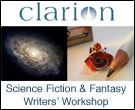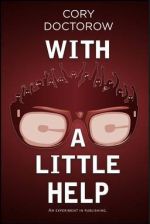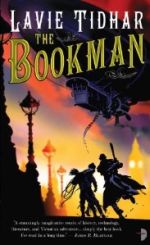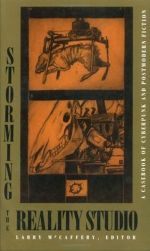Is SciFi good Kindling?
E-books and the future of science fiction
By reading electronically, we may be training our brains to dumb themselves down. A complete shift to e-books may simply make us, as a species, stupider. (Note: This doesn’t mean you should stop reading Redstone!) We may wake up (in far less than Luke Wilson’s 500 years) to find ourselves in an Idiocracy of our own making.
But let’s also look on the bright side. If e-books increase in popularity to such a degree that everything which appears in print also appears online, one obvious benefit is that it makes all of those texts more accessible. And here I don’t mean the obvious. Of course those who have Internet can then read books, even if they don’t have easy access to physical books, such as sailors on a long ocean voyage (see Prime Palaver #7). But I refer instead to the type of universal access which fellow Kindle-reader Sarah Einstein championed in “The Future Imperfect” last issue. By plugging electronic texts into Braille machines or voice synthesizers, disabled persons who might be unable to read material texts due to physical or cognitive differences such as blindness or dyslexia would able to enjoy a much wider (and dare we hope, universally broad?) array of books. (Einstein herself writes of listening to her Kindle on her stereo.) Such a society, I think, would be laudable.
My final optimistic prediction has to do with how the rise in e-books might transform books in general, and science fiction in particular.
By now you may have been wondering “Why all the hyperlinks in this essay?” when my last article had only two. (At least you may be wondering that if my esteemed Editor didn’t for some reason remove them all before publishing this.) This article is my meager attempt to transform the industry, by example. Next you should be asking “What’s so new about hyperlinks?” Nothing, really, but in standard e-books so far they are rather rare. That’s because most e-books are simply existing physical books translated into an e-book format, remaining just as linear as papyrus scrolls.
Since you can’t really put hyperlinks in a physical book, and since physical books are still the norm, I expect we’ll see mostly linear works for the near future. But as e-books become the standard, we’ll see texts begin to take on more and more of the nonlinearity of the Internet. Nonlinearity is of course particularly useful in nonfiction, where links to word definitions and related ideas can be quite useful to the reader. For example, the RAND Corporation has published a DVD e-book, I Want You! The Evolution of the All-Volunteer Force (2006), which includes primary source documents linked to the main text (Warren, p.84). Many secondary school textbooks also take full advantage of hypertext, including links to further improve and assess mastery, even including interactive games and quizzes. In essence, this is what I’ve done (or tried to do) with the links in this article (except no games or quizzes).
But how would hypertext work in actual stories? Certainly it could work in the same way as it does in non-fiction, by providing supplementary information. Imagine a Lord of the Rings with all of the appendices linked from relevant points in the text, so you can easily look up that elvish word or figure out where Bullroarer Took fits in Frodo’s family tree. Or when reading a Clockwork Orange, instead of flipping to the back to find out what “viddy” means, you simply click on the word. While several e-readers, including the Kindle, do include a built-in dictionary lookup function, I doubt you’ll find “skolliwol” in any of them. Scifi in particular, which often introduces novel terms for new concepts, would definitely benefit from such linked glossaries and other supplemental material.
But that’s simply extending the nonfiction use of links to stories. Can one make a story itself nonlinear? Nonlinearity is not really new in fiction. Julio Cortazar’s Hopscotch (1963) is one example, and the currently repopularized “Choose Your Own Adventure” series attempts something similar (Warren, p.85). But one problem with putting links in stories is that they could interrupt the flow of the narrative. Still, one might imagine a fractured narrative which could be told nonlinearly.
























5 comments
[…] Is SciFi Good Kindling? by Henry […]
This is a weird thing which seems to affect a lot of sci-fi writers (in my experience, anyway), both in their view of the future of publishing, and also in their adoption of new technologies. As a sci-fi fan and aspiring writer, I can’t imagine not adopting the newest, coolest gadgets as they come out — I get to live the stuff I read about growing up!
[…] This post was mentioned on Twitter by Mr Spock. Mr Spock said: Is SciFi good Kindling?E-books and the future of science fiction … http://bit.ly/agxnlg […]
Henry,
I appreciate the nod in your essay, but I have to jump in and correct a possible misinterpretation of the information. I use my Kindle both for e-books and Audible files. Sadly, the fear of the new publishing paradigms made possible by e-readers has over-ridden the goodness that would be more universally accessible reading for people whose bodies function in ways that limit their ability to read directly from a text object. (This is not just an issue for the visually impaired; many people with mobility and motor function issues also find books problematic.) When Amazon introduced the text-to-speech function, the writing community was disquieted. This essay by Roy Blount, Jr. is probably the most erudite version of the argument against this feature: http://www.nytimes.com/2009/02/25/opinion/25blount.html
Now, as a writer, I do care about rights and about the already paltry revenues that most writers see from their efforts. That said, I care more about accessibility. Amazon has seriously crippled the function, allowing publishers to “opt out” (which most have done) and seriously limiting the liberatory potential of the Kindle for persons with disabilities.
I have played with Kindle’s text-to-speech tool, and frankly, though it’s cool, it doesn’t strike me as a serious threat to the audio-book market. The voice can’t inflect, it can’t provide subtle clues to character shifts in dialog, and it rise and fall in tempo and pitch along with plot points.
It’s my sad belief that, in this case, the Author’s Guild came out on the wrong side of an issue that matters deeply to persons with a variety of disabilities. I hope that it’s a short-lived mistake, and that we see text-to-speech capabilities built into all e-readers in the near future.
Sarah
[…] or with their wonderful essay on eReaders at “Is SciFi good Kindling?” by Henry Cribbs […]